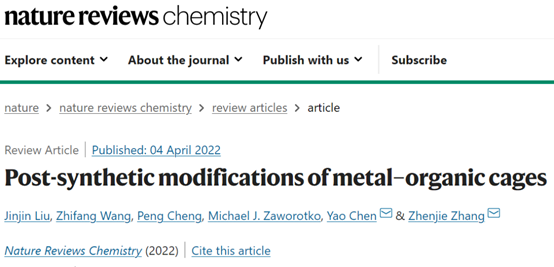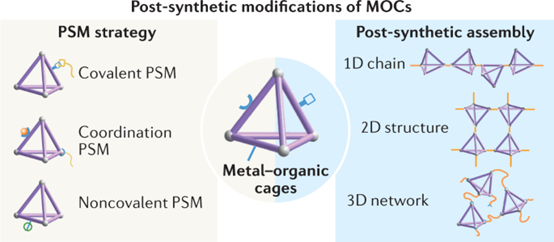Nankai Scholars Published a Paper in "Nature Reviews Chemistry" on the Post-synthetic Modification of Metal-Organic Cages (MOCs)

The design, synthesis and functional development of Metal-Organic Cages are the frontier fields of the current chemical research. Recently, Zhang Zhenjie, a researcher from the College of Chemistry of Nankai University and Chen Yao, a researcher from the State Key Laboratory of Medicinal Chemical Biology of Nankai University published a paper in the international top journal Nature Reviews Chemistry (IF 34.035) upon invitation under the title: "Post-synthetic Modification of Metal-Organic Cages (MOCs)", which summarized the post synthetic modification strategies of Metal-Organic Cages and discussed the future of the new materials and functions generated by post modification.
According to Liu Jinjin, the first author of the paper as well as a doctoral candidate from the College of Chemistry, Nankai University, this paper provides a comprehensive summary of the PSM methods for MOCs and an in-depth discussion of the current modified assembly strategies used in MOCs. "For example, according to the product dimension of PSM, there are three categories: modification from zero dimensional cage to zero dimensional cage, assembling from zero dimensional cage to one-dimensional or two-dimensional structure, and assembling from zero dimensional cage to three-dimensional polymer. In addition, the categories can also be divided into covalent bond, coordination bond and non covalent interaction as per type of chemical bond or interaction formed during modification and assembling."
Zhang Zhenjie and Chen Yao have been dedicated to the research of MOCs post synthetic modification methods and jointly published a paper in Journal of the American Chemical Society in 2019, in which, they first presented the concept of hyper-cross-linked Metal-Organic Cages and prepared a new polymer-Metal-Organic Cages composite membrane by using soluble MOCS as polymer comonomers. The multifunctional composite membrane carries over the advantages of MOCs and high polymers and significantly improves the mechanical properties and selective separation properties of membrane materials.
"Post synthetic modification can be used to prepare MOCs new materials that are difficult to be obtained through direct synthesis. Post modification on MOCs can not only introduce new functional groups, but also adjust some features of MOCs, such as stability, solubility and porosity, so as to improve the material properties." Zhang Zhenjie added. In addition, if MOCs are assembled into a multi-dimensional structure as building blocks, structural diversity of porous materials can be enriched; if assembled with macromolecules or polymers, machinability of MOCs can be improved and application field of MOCs will also be greatly expanded.

Fig.1 Post modification strategy and post assembly type of Metal-Organic Cages
"We also look into the future of the post synthetic modification of MOCs at the end of the paper. The future research may focus on application demands, especially the design of green, efficient and cheap synthetic routes. For example, green energy sources, such as light and hydrogen, can be used to develop gas phase post synthesis modification, or synthesis of 'smart' MOCS materials can be realized through reversible post modification." Zhang Zhenjie said.
This research has been funded by the National Natural Science Foundation of China and National Key R&D Program of China.
Link to the paper: https://www.nature.com/articles/s41570-022-00380-y
(Edited and translated by Nankai News Team)









